












A Virtual Event • August 1-2, 2025 Leading Together
2.0

“A must for all current and future association and unit leaders!”
2025 NAP Virtual Leadership Conference August 1-2, 2025
Learn soft skills for leaders. topics include:
• Working With Introverts
• Navigating the NAP Website
• strategies for Converting Provisional Members
• the Art of gathering
• You’ve got this –
Presented by NAP President Alison Wallis, PRP
• Fiduciary Responsibility
• And more to be announced!
Watch your inbox for registration details!
Beth Sapp James, PRP
Tamara Harris, PRP
Steven Cook,
Representatives
Lucy H
Anderson, PRP
Lavon Moore, PRP
Parliamentarian
C J Cavin, PRP
Executive
Cynthia Launchbaugh
Legal
Daniel Ivey-Soto, PRP
Official publication of the National Association of Parliamentarians® 213 S Main Street • Independence, MO 64050-3808 816 .833 .3892 • 888 .627 .2929
hq@nap2 .org • www .parliamentarians .org
Traci Bransford-Marquis, PRP
npeditor@nap2 org
Assistant Editor
Josh Martin, PRP
NP Review Committee
Ann Guiberson, PRP, Chair
Lynna Gene Cook, PRP
Kirk Overbey, PRP
Nancy Sylvester, PRP
Parliamentary Research Committee
Michael Malamut, PRP, Chair
Shannon Sun, PRP
Michael C Taliercio, PRP
Rachel Glanstein, PRP, Committee Advisor C J Cavin, PRP, NAP Parliamentarian/Consultant
Special Consultant
Ronald Dupart, PRP
(Registered U S Patent and Trademark Office, ISSN 8755-7592)
Published quarterly by the National Association of Parliamentarians®
©2025 All rights to reproduce or reprint any portion of this publication are reserved, except by written permission of the editor. Opinions expressed herein are not necessarily those endorsed by NAP.
Subscription and change-of-address requests should be directed to NAP at the above address .
Annual subscription: $30 • Single copy: $8
National Parliamentarian generally publishes only original works that have not been published elsewhere . Articles will be edited to conform to The Chicago Manual of Style (18th ed ) and may be edited for content and length Article text should be submitted in Microsoft Word or rich text format and transmitted via e-mail Illustrations, photographic prints and high-resolution photos are welcome . Materials submitted will not be returned unless special arrangements are made in advance with the editor .
Contributors must include a completed “Assignment and Transfer of Copyright” form with their submission, granting NAP the copyright or permission to publish .
Volume 87, No 1 (Fall 2025) August 1, 2025
Volume 87, No . 2 (Winter 2026) .
Volume 87, No . 3 (Spring 2026)
November 1, 2025
February 1, 2026

As the National Association of Parliamentarians® (NAP) moves into its next term, I applaud National President Alison Wallis, the national officers, board of directors, and appointed national committee chairs and members for serving as paragons over the last two years . Communication, civility, etiquette and professionalism are attributes that I acknowledge for this term (as well as previous terms) . In this issue, community is the theme as the services of NAP parliamentarians continue to grow and evolve as a profession .
To evolve, I suggest the simple art of connecting through community . Since COVID, separation and isolation have become more the norm . I beseech all to seek to connect with our communities, our nation and the globe . And yes, it really starts with this parliamentarian community where communication, etiquette and confidence can ensue with thoughtful speech, listening to others, and introspective insightfulness .
The National Parliamentarian, a scholarly journal, seeks articles that engage the parliamentarian at all levels . I remember studying for the PRP through these articles . Provisionals can learn from these articles as well . Notwithstanding, in this NP issue, I applaud the parliamentarians, now known as the Parliamentarians of the Caribbean, who communed together on a cruise to San Juan, Puerto Rico back in November 2024 . What fun!
It has been an honor to serve as the NP Editor for 2023-2025 . I thank the editorial board listed on the masthead . It is always nice to be surrounded by professional and smart people . See you at the NAP 45th Biennial Convention in Phoenix . All for now

Traci Bransford-Marquis, PRP
NAP NP Editor, 2023-2025 npeditor@nap2.org

“It is our choices, Harry, that show what we truly are, far more than our abilities.”
— J .K . Rowling, Harry Potter and the Chamber of Secrets
I hope members of the National Association of Parliamentarians® (NAP) are looking forward to attending the biennial convention in Phoenix, the forty-fifth convention in our history . The convention and workshop committees, District Eight and Arizona Association members, and other volunteers are working steadily to make the meeting a meaningful event . This issue contains many details . Meeting in person with colleagues and hearing top-notch presentations are surely sufficient motives to attend this multiday national event . Additional incentives are surely voting on bylaws and electing members of the board . One thing many members agree on is the fact that business meetings at an NAP convention are never boring .
Above all, I hope members will realize the power they hold to determine the direction of the organization . A vote is a choice . Parliamentarians know how to take a vote by voice, by show of hands, by ballot, and by electronic means . Parliamentarians know how to create a blank to consider multiple choices . Business brought before the assembly represents choice, with all the responsibility and opportunity that choice brings . Parliamentarians understand the values of choice . What is the real purpose of debate, if not to reach the right answer by reason? On every issue, make conscious, informed, and fair choices for the organization’s overall benefit . There is value in knowing the history and customs of a senior and respected organization such as NAP. There is also value in trying something new and considering different alternatives . In addition to formal voting, you make changes for yourself and the organization by your choice of how to spend your time and talents . Attending events, interacting with others interested in democratic decision making, doing constructive work – these choices make the difference .
As we reason together on the floor of the convention, we must inform ourselves, then make the best choice . Although we may have strong opinions, we must respect others who do not make the same choice . After decisions are made, we must go forward in goodwill and continue the work of so many before us . Our choices today affect our future organization . Attendance at the convention is an investment in our personal development as well . Let’s make the 45th Biennial Convention a time to enjoy our community today as we transition into the future .

Alison Wallis, PRP 2023-2025 NAP President
Letter to the E DITOR
Dear Editor Bransford-Marquis:
While reading the Winter 2025 issue of the National Parliamentarian (vol . 86, no . 2), I noticed a significant error in the article entitled, “Striking a Balance:” on pp . 10-13 . On p 10, under the second bullet point, the author equates executive boards and executive committees as follows: “Executive Boards or Executive Committees are subsets of the main board, often composed of key officers… ” Although this description is correct as to executive committees, it is incorrect as to executive boards In fact, a board of directors, which the author describes on p 10 under the first bullet point, is an executive board . [See RONR (12th ed .) 49:3 and 49:13]
The error is compounded by the terms appearing above the graphic at the top of p . 10, i .e ., both “Board” and “Executive Boards” along with “Executive Committees .” For your convenience, I have attached a photo of p 10
Please consider publishing in the next issue of the National Parliamentarian a correction to this article that distinguishes between “executive boards” and “executive committees ”
Thank you for considering my request . I would be happy to answer any questions you may have .

Susan
Susan Eads Role, JD, PRP, CP Professional Registered Parliamentarian Certified Parliamentarian Parliamentary Services, LLC 723 General Taylor St New Orleans, LA 70115-2614 202-905-8016
serole@parliamentaryservicesllc com
www .parliamentarians .org/find-a-professionalregistered-parliamentarian/entry/32/?gvid= 4656aipparl org/listing/susan-eads-role
This letter to the editor is being published as is . The editorial board takes no stance on the article or letter to the editor . I invite NP readers to compare the article against the letter to the editor and form their own opinions,
Carl Nohr, PRP
The presiding officer of a deliberative assembly should be chosen principally for the ability to preside.1 While knowledge of the rules of the organization is important, no rules can take the place of tact and common sense on the part of the presiding officer. An additional quality “required” of the chair of an assembly is impartiality.2 This is a necessary element of the ability to preside,3 because the effectiveness of the presiding officer depends on a relationship of trust and confidence between him and the assembly members.4 This duty of impartiality also applies to members of an organization serving as the assembly’s parliamentarian.5
Impartiality can be broadly defined as the characteristic of not supporting either side in an argument . More specifically when used in connection with serving as a presiding officer in a deliberative assembly, impartiality is the lack of favoritism towards any side in debate, or any person in an election . Impartiality is not disinterest . The presiding officer should be at least as interested as any member in furthering the business of the assembly . In fact, expediting business in every way compatible with the rights of the members is one of the explicit duties of the presiding officer . 6 The work of the assembly moves forward more quickly if the chair of the meeting has and maintains the confidence and trust of the members by being impersonal and objective . 7
Impartiality is both an attitude and a collection of behaviors that demonstrate it, some of a parliamentary nature and some of a personal nature . The parliamentary behaviors of the chair that demonstrate impartiality include not taking any of the following actions while in the chair;8 making motions, debating or voting . There are exceptions to each of these that will be discussed later . In addition to not making motions, debating or
1 RONR (12th ed ) 47:6
2 RONR (12th ed ) 43:29
3 RONR (12th ed ) 3:9
4 RONR (12th ed ) 43:29
5 RONR (12th ed .) 47:55
6 RONR (12th ed .) 47:7
7 RONR (12th ed .) 3:9
8 RONR (12th ed .) 47:55
voting, there are other parliamentary behaviors that are used to demonstrate impartiality . These include the patterns of formality9 and the rules for assigning the floor . 10
According to formal parliamentary rules, the chair is addressed by his or her title and refers to him or herself in the third person . The chair avoids the use of the name of members, usually referring to them instead as “the member . ” The chair may use the name of the member when assigning the floor, announcing the members of a committee, or in disciplinary proceedings . 11 When assigning the floor, the chair should be careful to refer to all members in the same format, for example by title, full name, first name, or as the member at a microphone, lest the chair be perceived as showing favoritism by using a more familiar form of address for some members than others . Also, if it is the rule of the organization to have speakers identify themselves before making their remarks, the chair should apply this rule to all members uniformly, lest the chair be perceived as showing favoritism to the wellknown members by excusing them from compliance with this rule .
Before speaking in debate, a member must obtain the floor . 12 Depending on whether there is a pending question, and if so, whether it is debatable, there is an order of preference for recognition to speak . 13 There are additional rules that determine which
member should be recognized when more than one person is claiming the right to speak,14 or when a member interrupts another who already has the floor . 15 To maintain impartiality, the presiding officer must follow these rules, as well as dispassionately process any points of order and appeals that arise in connection with the order of speaking .
Although all presiding officers, regardless of experience, will avoid making motions, debating or openly voting in a deliberative assembly, there are many less obvious ways that a lack of impartiality may unintentionally be evident to members of the assembly . Body language, facial expressions, voice, and even dress may show favoritism .
Robert’s Rules of Order Newly Revised (12th ed .) (RONR) prescribes a variety of scenarios when the chair of a meeting should stand . 16 These should be followed consistently to demonstrate that the chair is actively and neutrally engaged in the meeting . Other movements should be limited . Arm and hand gestures should be
9 RONR (12th ed ) 3:9
10 RONR (12th ed ) 42
11 RONR (12th ed ) 3:13
12 RONR (12th ed ) 3:30
13 RONR (12th ed .) 42:9-13
14 RONR (12th ed .) 42:6-8
15 RONR (12th ed .) 42:18-22
16 RONR (12th ed ) 47
avoided . If used, they should be consistently kept in a neutral plane at the mid-body level to avoid portraying a private passionate perspective the chair may have .
Facial expressions may be difficult to completely control, but the chair should make every effort to maintain a neutral expression as much as possible .
The chair should also maintain a neutral tone of voice . This is particularly important when announcing the outcome of votes and elections . The chair should completely avoid any gestures or vocal exclamations of happiness or disappointment during such announcements . This is not to suggest that a monotone voice is required . A natural, varied tone of voice is best . If congratulations to newly elected individuals are offered by the chair, the same words and tone should be provided uniformly to all successful candidates to avoid revealing the chairs’ preferences . If responding to a parliamentary inquiry, the chair should do so fairly, completely and in a neutral fashion, regardless of the perceived intention of the inquirer, and the chair’s opinion of it . The chair’s thoughts on the value of the inquiry must have no role in formulating the response, unless the inquiry is clearly dilatory, in which case the chair may rule it not in order . It is the chair’s role to facilitate process, not to influence content .
Manner of dress is an important consideration for effective presiding17
and also plays a role in demonstrating impartiality . The presiding officer should avoid any colors or style of clothing that might indicate affiliation with a faction at a meeting . Also, pins, buttons, or hats that indicate support for an initiative or candidate should not be worn by the presiding officer . The chair’s seat and lectern in a hall should also be cleared of any such promotional material . While chairing a meeting, the presiding officer may not make motions, debate or vote, with exceptions . If the chair of a large deliberative assembly (see pg . 11 for small boards and committees) wishes to make a main motion, he may suggest to the assembly that the chair would entertain such a motion . However, the chair would be wiser to arrange before the meeting for such main motions as he sees the need for to be made by others . Procedural motions are another matter . RONR explicitly allows the chair to assume and state certain specific procedural motions . The presiding officer, on his own initiative, may submit his objection to consideration of a question . 18 The related motion, point of order, can be bypassed entirely by an alert presiding officer, as it is his responsibility to immediately correct any noticed
17 National Parliamentarian Summer 2022, Developing a “Presiding Presence”, Carl Nohr
18 RONR (12th ed ) 26:3
Procedural suggestions should never be made or neglected to suit the chairs own wishes but used impartially to assist members in using proper procedure without regard to the chair’s own opinion.
breach of order . 19 The motion
Consideration by Paragraph is also subject to the initiative of the presiding officer, who may on his own apply this motion to any suitable elaborate main motion, unless he thinks the assembly might wish otherwise, or the assembly moves to consider the motion in whole . 20 In voting procedures, the chair may on his own initiative order a voted count, thus both assuming the motion to count and its adoption . 21 When announcing a resignation, the chair can assume a motion that the resignation be accepted . 22 If a committee’s report contains recommendations but the reporter is either not a member of the assembly or for some reason did not move the adoption of the recommendations, the chair may assume and state the motion to adopt the recommendations . 23 Similarly, the chair may assume and state a motion to receive a committee report if it’s reception is not otherwise provided for in the order of business . 24 In the formal organization of a convention, normally the three essential committee reports are moved for adoption by the reporter . If they do not move the adoption, the chair may assume and state the motion for adoption . 25 In disciplinary proceedings,
a motion to require the offending member to leave the room during the consideration of the penalty may be assumed by the chair . 26
In addition to the above specific procedural motions, RONR allows the chair to raise a question of order on his own accord . 27 This is a broad exception to the proscription of making motions by an impartial chair . The possible benefit of a procedural motion may be assumed and suggested to the assembly anytime the chair sees an opportunity to expedite business . The chair should continually be assessing the will of the assembly and assisting it with any parliamentary situations that may arise . Procedural suggestions should never be made or neglected to suit the chair’s own wishes, but used impartially to assist members in using proper procedure without regard to the chair’s own opinion .
19 RONR (12th ed ) 23:3
20 RONR (12th ed ) 28:4
21 RONR (12th ed ) 4:53
22 RONR (12th ed ) 32:5
23 RONR (12th ed ) 51:12
24 RONR (12th ed .) 51:28
25 RONR (12th ed .) 59:12
26 RONR (12th ed .) 61:16
27 RONR (12th ed .) 26:3
There are exceptions to the proscription against the presiding officer to debate or vote in deliberative assemblies . 28 If he is a member of the assembly, the chair has the same rights as other members but may only exercise them by relinquishing the chair . If the chair wishes to engage in debate, he announces this and requests that the next qualified person according to the organization’s governing documents assume the chair . If there is no such person, the chair may appoint a chair pro tem, assuming unanimous consent . If there is an objection, members of the assembly may nominate other candidates . The chair pro tem is then decided by election, with the chair’s choice treated as another nominee . Having relinquished the chair for this particular item of business, the presiding officer should remain out of the chair until the final disposition of the main motion concerned . 29
The exceptions to the requirement for the presiding officer to relinquish the chair to debate are debate on an appeal and a point of order that the chair has submitted to the judgement of the assembly . In these cases, because his participation in debate relates to the function of presiding, the presiding officer may debate without leaving the chair . 30
There are also exceptions to the proscription against voting by the
chair . In a deliberative assembly, the presiding officer, if a member of the assembly, can vote in the case of a secret ballot like any other member . 31 Another exception occurs in open voting . The chair may vote if the vote will affect the outcome . In such a case, the presiding officer, if a member of the assembly, may, but is not obliged, to vote . 32 That is, when a majority vote is required for adoption, and a tie exists, the chair may vote in favor as this will change the outcome from lost to adoption of the motion . The chair may not vote against, as the motion is already lost by a tie vote regardless of the chair’s vote . On the other hand, if the vote is one more in the affirmative than in the negative, the chair may vote against, thus creating a tie and hence loss of the motion which otherwise would have been adopted . Similar considerations apply to other voting thresholds; the chair may vote in a situation where the vote will make a difference . In these settings, before deciding to vote, the experienced chair will carefully consider whether the reversal of adoption or rejection of the motion under consideration caused by his
28 RONR (12th ed ) 47:55
29 RONR (12th ed ) 43:29
30 RONR (12th ed .) 43:30
31 RONR (12th ed .) 45:28
32 RONR (12th ed .) 44:12
Even if it is essential for the chair to debate, they should speak last so as not to suppress the opinions of other members who may not contribute their thoughts if the chair has already spoken.
vote alone is worth the inevitable loss of impartiality .
Finally, the rules for impartiality for a chair are relaxed for small boards33 and committees . 34 In most cases,35 committees are created to consider, investigate, or take actions pre-approved by the parent deliberative assembly on certain matters or subjects, and are not in themselves considered to be a form of deliberative assembly . Therefore, the chair of a committee is permitted to make motions, engage in debate, and vote . However, the experienced committee chair will do none of these things unless it is essential to move business forward . This approach will support the perception of the chair as impartial . Even if it is essential for the chair to debate, they should speak last so as not to suppress the opinions of other members who may not contribute their thoughts if the chair has already spoken . The same is true with open voting; the wise chair

will consider voting last to avoid influencing other members . In conclusion, impartiality is vital to an effective presiding officer . Understanding the rules that demonstrate impartiality is important . Additionally, skills and behaviors that can enhance a chair’s ability to remain impartial, or at least to appear as such, can be learned by observation and practice . Observing skilled presiding officers can be helpful . Watching what they do say, and how they say it, can be instructive . To practice skills, new presiding officers can work with a friend or mentor to provide feedback . Watching recordings of oneself while presiding can also be revealing . Finally, seeking feedback when we serve as a presiding officer can refine our behavior and increase our effectiveness . NP
33 RONR (12th ed .) 49:21
34 RONR (12th ed .) 50:25
35 RONR (12th ed .) 50:1
Carl Nohr, PRP, joined the NAP in 2013 and became a PRP in 2018 He serves as a director, vice-chair, secretary, and speaker for several associations . He is a student of good governance, meeting management, and decision making He loves to share knowledge and believes we can all learn much from each other
You may find it interesting that there are 7 musical notes in the treble clef scale, 7 colors of the rainbow, and 7 subsidiary motions in Robert’s Rule of Order Newly Revised (12th ed .) (RONR) . What a coincidence! And each of these groupings of 7 has a mnemonic device attached to it to help you remember the 7 components of the group in their proper order .
For example: The notes of a scale are simple – the letters A through G . To assist in putting them in the correct location on the musical scale, the mnemonic aid is that the letters on the lines of the scale, beginning at the bottom, go upward with the letters E - G - B - D - F put on the lines (every good boy does fine); and the letters F - A - C - E should be placed on the spaces going upward . For the colors of the rainbow, the aid to use are the letters ROY G . BIV (red, orange, yellow, green, blue, indigo, v iolet) . The created mnemonic device attached to the letters could be: Read Out Your Good Book In Verse .
Now what about the 7 subsidiary motions and their order of precedence?

David Mezzera, PRP
We know that the lowest listed motion in order of ascendancy is postpone indefinitely with the other six moving up the ladder with the motion to lay on the table at the top . As a simple rule, you go up the ladder making motions in that order and back down the ladder disposing of them in that order . If you don’t have your RONR handy (t4) and don’t have your goldenrod sheet handy showing these motions in their proper order, you can easily create a chart on the spot, using this helpful mnemonic:
The motions from lowest precedence to highest precedence can be represented by the letters P - A - C - P - L - P - L, standing for Postpone Indefinitely / Amend / Commit / Postpone Definitely / Limit or Extend Limits of Debate / Previous Question / Lay on the Table . Some people choose to list them from top to bottom, hence, L - P - L - P - C - A - P.
Then, if it would help you to remember the sequence of the 7 letters, you could create a sentence or phrase to serve as a mnemonic with each word beginning with the appropriate
letter in order . Here’s an example or two: Political Action Committee / Parliamentary Law / Parliamentary Law . Or from the top: L P (long-play as in records) / L P / C A P (the many hats you wear as a parliamentarian) . Once that is done, you can then use the mnemonic to list the 7 letters from top to bottom or bottom to top and then fill in the names of the subsidiary motions that begin with those letters . Have some fun in coming up with your own tagline!
All parliamentarians should know the order of precedence of these subsidiary motions to allow you to know which motions might be in order at a particular time . And with only 7 such subsidiary motions, a parliamentarian should know key information (i .e . their standard descriptive characteristics) about each one off the top of their head . In order to serve as a chair or a consulting parliamentarian, as a minimum, you should know that you may not interrupt to make any of them, that they all require a second, and that the top three (L - P - L) are not debatable while the other four are debatable .

You should know that they all require a majority vote to pass – except L - P (Limit or Extend Limits / Previous Question) which require a two-thirds vote . They all could be reconsidered (with some exceptions along the way) . And they may all be amended with the exception of P - P - L (Postpone
Indefinitely / Previous Question / Lay on the Table) . These Lucky 7 are commonly used during a typical meeting, so their 7 standard descriptive characteristics should be second nature to you . That’s the real purpose of this article – to be sure you know your P - A - C - P - L - P - Ls up and down, backwards and forward, inside out!
P.S . Might you like a mnemonic aide to also remember the list of Privileged Motion in their order of precedence? Try this one from bottom to top: O - P - R - A - H (Orders of the Day / Privilege, Question of / Recess / Adjourn / Hour, to Fix the Time) . If you’re not a Winfrey fan but maybe a Marx Brothers fan, try the mnemonic from top to bottom: H - A - R - P - O . NP
David Mezzera, PRP, is a past president of the California State Association of Parliamentarians and a past District 8 Director
































Carol Prahinski, PhD, PRP
While reading Robert’s Rules of Order Newly Revised, (12th edition) (RONR), a member of a volunteer-led non-profit learned the meeting interval, such as day of the month, should be prescribed in the bylaws, and the hour and place should be prescribed in the standing rules (RONR 9:1, 56:33) .
Although the months of the meetings were in the bylaws, and the day was in the standing rules, the hour and location were missing . In addition, the secretary wanted a reasonable deadline for emailing the meeting agenda, minutes, and other relevant documents to the members . With the bylaws committee, the member proposed a motion to amend the standing rules by adding the hour, location, and that the “electronic call for the regular meeting will be provided at least three days prior to the meeting . ” The committee adopted it and gave previous notice to the members about the proposed amendments to the standing rules, which would be voted on at the next meeting .
A credentialled member expressed dismay . A three-days’ notice was not sufficient to add the event to members’ calendars .



After recognizing that the two members used different definitions of meeting notice, the organization was left with the following questions:
• According to Robert, what does notice mean? The scheduling of a meeting? Or the reminder communication to members of an upcoming meeting, which includes the agenda and minutes?
• How do other parliamentary and meeting resources distinguish these disparate concepts?
From the index in RONR, Robert provides two meanings of notice:
• Previous notice, or notice of motions, which means announcing the intention to make a proposed motion and, briefly, describe its substance . This previous notice can be made in writing or orally at a regular meeting .
• Notice also means the call of the meeting, which “… is a written notice of its time and place that is sent to all members of the organization a reasonable time in advance” (RONR 1:7) .
In this article, we explore multiple references in RONR and other



parliamentary sources to understand , as it relates to the call of the
A companion article titled “Notice This, Too,” to be published National Parliamentarian, will focus on previous notice .

No member shall be deprived of the opportunity to participate in the meeting (RONR 1:4) . Robert wants members to find the meeting information and suggests two places:
• The bylaws and standing rules (RONR 9:1), or
• With a resolution, which should give members sufficient notice of the meeting time so that they can attend “since…members cannot determine the meeting dates by consulting the bylaws…” (RONR 56:34) .
“To avoid uncertainty about what period in advance is reasonable, the specified number of days’ notice required…should be prescribed in the bylaws” (RONR 9:4) . Regardless of whether the meeting information is in the governing documents, organizations must send notice if:
• Scheduling is conducted by resolution (9:2);
• The meetings are separated by more than a quarterly time interval (9:3);
• In advance of a convention of delegates (9:3);















A member announced previous notice of business (10:44; 10:51);



The bylaws or standing rules








Yet, as a courtesy, and perhaps to ensure informed members and a quorum, “in many organizations, a call is sent to all members in advance of each meeting” (9:3) . As a matter of practice, many leaders remind members of the upcoming meeting by sending the minutes and agenda, which may also simplify the adoption of them . The secretary is responsible “to send out to the membership any required notice of each meeting, known as the call of the meeting…” (RONR 47:33 (9)) . In addition, the secretary is responsible to create an order of business (e .g ., the agenda) for “all matters known in advance that are due to come up and – if applicable – the times for which they are set” (RONR 47:33 (10)) .
The author reviewed additional parliamentary and meeting sources as referenced with the bibliography to determine distinctions regarding the call of the meeting, such as:
• The scheduling of a meeting’s date, time, and location, and
• A reminder notice of the meeting, which may include an agenda and draft minutes .
Many of the parliamentary resources were published before the

































advent and ubiquity of electronic communications, which would have influenced transmission methods Cannon (1982), Mina (2002), and Renton (2005) define and distinguish between notice (of the meeting), agenda, and the minutes . “The notice of the meeting is a cover letter, inviting every participant to the meeting” (Mina, p . 306) . Renton clarified the meeting notice should include the name of the organization; the fact that this document is notice of a meeting; the type of meeting to be held; the precise date, day of the week, time, and place; and the business to be transacted, including the text of all motions of which (previous) notice has been given (p . 151) . “Additionally, any information that would assist a member in preparing for the meeting should be included” (AIP, p . 231, 20 .6) For example, the notice can be embellished with a map reference, parking advice, the best public transportation, and meal arrangements (Renton, p . 153) . The meeting package is a set of well-organized reports and documents that enable quality decision making . It includes “the notice of the meeting, the meeting agenda, minutes of the last meeting, progress reports, reports to specific agenda items, decisions to be made, and options for decision making” (Mina, p . 308) .
Similar to Mina, Renton suggests that the minutes (p . 162) and the proposed agenda (p . 7, 153) are useful supplements to the meeting notice .
“They need to know what to expect when they attend…” ( Some additional insights regarding the call of the meeting include:
“When the charter or statute fixes a regular time for meetings, no special notice is required” (Mason, p . 560) . Demeter concurs that a meeting notice is not required if the time and place are fixed by bylaws, rules, “custom, or usage (but it is recommended)” (p . 203) .



• A meeting notice is not required with an “adjourned meeting . However, it is good policy to do so” (Demeter, p . 120) .
• Although both Demeter and Cannon recognized that the number of days’ notice is organizationdependent, they prescribed anywhere from three to seven days based on the routine nature of business, travel distance, and meeting frequency (Demeter, pp 13, 203; Cannon p . 88) .
The word notice may create confusion, even if we only focus on one of Robert’s definitions . When an organization’s meeting dates and times are not explicitly stated in the governing documents, the organization has two options:
• Amend the bylaws and/or rules of order .
• Continue to communicate meeting dates and times to the members with a reasonable amount of notice .



Many published parliamentarians suggest reasonable notice may be mentioned at the start of this article, the members chose to add a standing rule which used the term meeting package: “At least three days before a meeting, the secretary must provide electronically the meeting package, which includes the meeting notice, orders of the day, draft minutes, and notice of pending business when applicable . ” The standing rules were also amended to include the meeting time . These governing documents enable members and guests to know the meeting schedule . In addition, the secretary has explicit guidance on the expected process for communicating business with reasonable notice, as determined by the members . NP



















American Institute of Parliamentarians Parliamentary , 2nd edition, American Institute of Parliamentarians, USA, 2023


Cannon’s to Rules of Order, Houghton Mifflin Co, Boston, MA, 1992 .







Demeter, G . Demeter’s Manual of Parliamentary Law and Procedure, Blue Book edition, Little Brown and Company, Boston, MA, 1969
Mason, P Mason’s Manual of Legislative Procedure, McGraw-Hill, New York, NY, 1953
Mina, E . The Business Meeting Sourcebook . American Management Association Intl, AMACOM, New York, NY, 2002
Renton, N E Guide for Meetings and Organizations, Volume 2: Guide for Meetings, Lawbook Co, Sydney, Australia, 2005 .
Robert, H ., III, Honemann, D .H ., Balch, T J , Seabold, D E and Gerber, S Robert’s Rules of Order, Newly Revised, 12th edition, PublicAffairs: Hachette Book Group, New York, NY, 2020
https://twitter .com/ napparlypro
https://fb .com/ parliamentarians/

Carol Prahinski, PRP, serves as a parliamentarian and provides training for international, national, state, and local organizations She is a director for the Michigan State Association of Parliamentarians and a member of three units in Florida and Michigan and the FSAP. She is a retired professor of supply chain management at Michigan State University and a past international director for Toastmasters



November 9-16, 2024, the NAP Educational Foundation set out on an adventure in the Caribbean!
Parliamentarians from all over the United States met up in San Juan, Puerto Rico . On the 9th, we were greeted by the press secretary for the Majority Leader of the House of Representatives and were provided a tour of the House of Representatives and lunch . NAP President Alison Wallis, PRP, along with NAPEF President Ron Stinson, PRP, presented the Press Secretary with twelve copies of the current edition of Robert’s Rules of Order Newly Revised, and other educational materials . We were invited to take a group photo in the House Chamber . At the end of our tour
Elaine Vetter
participants were presented with a medallion with a seal of the House of Representatives in a wooden case . Then the group of adventurers were taken to the Wind Star Cruise Line’s Star Pride where we would begin our journey to five of the windward islands . The service on board was attentive, the rooms spacious, and the food was bountiful and delicious . Our first day was a day at sea . Parliamentarians were given a special t-shirt which proudly identified us as “Parliamentarians of the Caribbean” and that is how we were known for the entire cruise . Word passed quickly that there was a group on board who studied Roberts Rules and could answer questions about how to get

control of a meeting, among other topics . Other passengers were asking how they could get a t-shirt (it really is a nice t-shirt)!
Our first day at sea was spent studying and attending educational sessions . We had a comfortable conference room and terrific
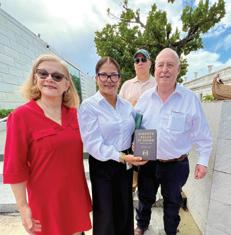
instructors . Topics covered appealed to both the novice and experienced parliamentarians . We spent our other days exploring the islands and our nights visiting with old and new friends . Special thanks to NAP President Alison Wallis, PRP; NAPEF President Ron Stinson, PRP; the NAPEF Trustees; and all who made the arrangements . This is a trip that will be long remembered and left us wishing for one more day on the Star Pride . NP

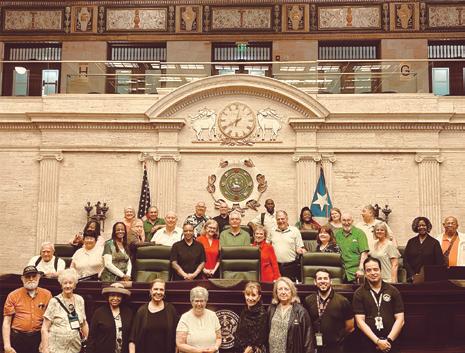
Elaine Vetter has been an active member of the San Antonio Unit for three years’ plus . She currently is serving as the TSAP Nominating Committee Chairman . Elaine is a sixth generation Texan, a native of San Antonio and a direct descendent of the oldest signer of the Texas Declaration of Independence, Collin McKinney Elaine is a retired Human Resources Professional and C M P (Certified Meeting Professional) Elaine earned her MBA at the University of Dallas
6:30 p.m. • August 22, 2025
Sheraton grand at Wild horse Pass Resort & Spa
Phoenix, AZ

Join the NAP Educational Foundation’s gala dinner at the NAP Convention and enjoy a delicious dinner, open bar, entertainment, and an evening of fellowship . Tickets are $135/person .
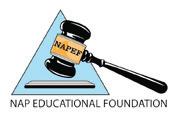
Join your fellow attendees to celebrate and reflect on all that you learned and discovered in Phoenix .
Purchase your tickets while registering for the convention.
August 20-24, 2025 Phoenix, Arizon

Join the National Association of Parliamentarians for their 45th Biennial Convention in Phoenix, Arizona and let Us Reason together.
Convention will take place August 20-24 at the picturesque Sheraton Grand at Wild Horse Pass just south of Phoenix It is an unparalleled opportunity to learn, network, and experience parliamentary procedure firsthand through daily business meetings and exceptional educational workshops .
During the convention, members will elect a new Board of Directors, vote on proposed bylaw amendments, and celebrate NAP’s past, present, and future Attendees will also deepen their understanding of parliamentary procedure and build life-long connections with fellow parliamentarians .
In other words, this is an event – an experience –you won’t want to miss.



August 20-24, 2025
Prepare yourself

Sheraton Grand at Wild Horse Pass, Arizona
The resort offers a wide range of activities from horseback riding and river boat adventures to the Aji Spa and several premium dining options from the upscale Kai restaurant, the only AAA Five Diamond and Forbes Five Star restaurant in Arizona to the relaxed atmosphere of Ko’Sin, the Native American “kitchen” located in the main resort building . You’ll also find a wide range of dining options nearby at the Gila River Casino and Phoenix Premium Outlets – both accessible by free resort shuttle .
Nearby, you’ll find Papago Park –home of the Phoenix Zoo and Desert Botanical Garden, South Mountain Park –where you can find petroglyphs left behind by ancient native civilizations, and various museums, shopping districts, and restaurants
Unable to attend in person? Choose the recording access option and receive educationexpert-led at convenience!your
Experience Native American culture at the renowned Heard Museum which offers an expansive perspective of native culture, the Casa Grande Ruins National Monument, or by taking a short daytrip to Montezuma’s Castle, an ancient limestone dwelling carved into the cliffs north of Phoenix . If you have a little more time, make the trip to Grand Canyon National Park, less than four hours from the resort

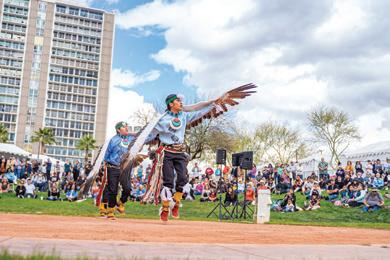



August 20-24, 2025 Phoenix, Arizon A
This schedule is subject to change.
Monday, August 18, 2025
8:30 a .m .-5:00 p .m . – PRP Credentialing Exam (separate registration required)
Tuesday, August 19, 2025
8:30 a .m .-5:00 p .m . – PRP Credentialing Exam (separate registration required)
1:30 p m -3:30 p m – Board of Directors Meeting
3:00 p .m .-6:00 p .m . – Registration & Credentialing Open
Wednesday, August 20, 2025
9:00 a .m .-5:00 p .m . – Registration & Credentialing Open
9:00 a m -10:15 a m – First Timers Orientation
9:00 a .m .-1:15 p .m . – Bookstore Open

10:30 a m -12:00 p m – Bylaws Forum & Delegate Orientation
1:30 p .m .-4:30 p .m . – Opening Ceremony & Business Meeting
5:00 p m -6:30 p m – Welcome Reception & Meet the Candidates
Thursday, August 21, 2025
7:00 a .m .-8:30 a .m . – Breakfast
7:30 a m -4:00 p m – Registration & Credentialing Open
8:30 a .m .-11:30 a .m . – Business Meeting
11:45 a m -1:15 p m – Past President’s Luncheon
12:00 p .m .-3:15 p .m . – Bookstore Open
1:30 p m -2:45 p m – Plenary Session: Rational Choice in an Irrational World Presented by Daniel Seabold, PRP
3:00 p .m .-5:45 p .m . – Business Meeting
Friday, August 22, 2025
7:00 a .m .-8:30 a .m . – Breakfast
7:30 a m -4:00 p m – Registration & Credentialing Open
8:30 a m -11:30 a m – Business Meeting
11:45 a .m .-1:15 p .m . – Awards Luncheon
12:00 p .m .-3:15 p .m . – Bookstore Open
1:30 p m -2:45 p m – Plenary Session: And the Breach Goes On…Advising Organizations Through Procedural Turmoil Presented by Roger Hanshaw, PRP
3:00 p .m .-5:30 p .m . – Business Meeting
6:15 p m -8:30 p m – NAPEF Gala Dinner
Saturday, August 23, 2025
7:00 a m -8:30 a m – Breakfast
7:30 a m -4:00 p m – Registration Open
8:30 a .m .-4:00 p .m . – Bookstore Open
8:30 a .m .-10:00 a .m . – District Meetings
10:15 a .m .-11:30 a .m . – Workshops
11:45 a m -1:15 p m – Networking Lunch
1:30 p .m .-2:45 p .m . – Workshops & Learning Labs
3:00 p .m .-4:15 p .m . – Workshops & Learning Labs
6:30 p .m .-9:30 p .m . – Closing Banquet & Installation of Officers
Sunday, August 24, 2025
9:00 a .m .-12:00 p .m . – 2025-2027 Board of Directors Meeting & Orientation


August 20-24, 2025 Phoenix, Arizon

This list is subject to change. Please check https://napuniversity.com/courses/80671 for updated information.
Thursday, August 21, 2025
Rational Choice in an Irrational World
Daniel Seabold, PRP
What is the best method for choosing between three or more candidates? Ranked-Choice? Plurality? Approval Voting? Or do we just keep balloting while the wheat grows tall? Political and practical considerations have raised interest in voting systems in which a candidate, to be elected, need not be the first choice of a majority of voters We’ll investigate the logical limitations on “rational” decision-making by these systems and discuss the challenges faced by the parliamentarian who is asked to help implement them
Friday, August 22, 2025
And the Breach goes On… Advising Organizations Through Procedural Turmoil
I NTERMEDIATE
Roger Hanshaw, PRP
Learn how parliamentarians can provide effective service to their organizational clients through tumultuous times in the context of ongoing breaches This session will address points of order, motions to rescind, and amend something previously adopted, all with a view toward helping organizations better govern themselves

Saturday, August 23, 2025
Throwing Spaghetti Against The Wall – So Where is the Beef?
B ASIC
Steven Britton, PRP, and the NAP Professional Responsibility Committee
Review and gain greater insight to the Code of Professional Responsibility for Parliamentarians
C.J. Cavin, PRP
Even the most experienced parliamentarians can fall into common pitfalls that undermine efficiency, fairness, and procedural accuracy . This interactive workshop will explore frequent mistakes in advising, presiding, and interpreting parliamentary rules, from misapplying Robert’s Rules of Order to failing to maintain neutrality . Through real-world examples and practical solutions, participants will gain insights into avoiding these errors and enhancing their effectiveness in meetings . Whether you’re a seasoned parliamentarian or just starting out, this session will help refine your skills and boost your confidence in handling procedural challenges .
Steven Cook, PRP, Mona Calhoun, PRP, & Robert Schuck, PRP
A thriving parliamentary unit requires a strategic approach to growth and sustainability This session will explore best practices for recruiting new members, retaining engagement and commitment, and reinforcing skills and leadership within the organization Attendees will learn practical techniques to attract prospective members, foster an inclusive and dynamic environment, and implement ongoing development strategies that strengthen unit effectiveness . By leveraging proven membership-building tactics and retention strategies, participants will leave with actionable insights to cultivate a resilient and engaged parliamentary unit .

August 20-24, 2025 Phoenix, Arizon
Kay Crews, PRP
This workshop is about those “nightmare” motions – Object to the Consideration of the Question, Call for the Orders of the Day, Postpone Indefinitely, A motion outside the Object of the Society, Appeal, and Secondary Amendments It will include presiding demos using an audience member and a presenter serving as the parliamentarian and “coaching” the member through their nightmare The audience will select which “nightmare” is covered next . (NOTE: We do not guarantee getting to all six nightmares, depending on audience response and participation.)
Who Really holds the gavel, the Meeting Chair or the Lawyer?
I NTERMEDIATE
Michael Malamut, PRP
This workshop will address issues that come up in the intersection between law and parliamentary procedure Common law and statute cover a number of meeting procedures . The law applicable to meetings varies based on the location of incorporation or organization (for unincorporated associations) . The workshop will

familiarize parliamentarians with common areas that might raise legal concerns, and how to address those issues if they come up .
David Mezzera, PRP
A number of motions in RONR have unique features (ie characteristics that are not found in any other motion) This makes for some mischievous or challenging situations for a presiding officer to process This interactive presentation will look at a variety of such motions and share input on how to understand and deal with their uniqueness
B ASIC
Justin Pappano, PRP, & Timothy Wynn, PRP
This session will discuss some of the common real-world scenarios that practicing parliamentarians may encounter and how to work through those scenarios during a meeting
B ASIC
Carol Prahinski, PRP
The purpose of notice is to enable the members to prepare and make great decisions during the meeting Robert’s gives us two forms of notice: notice of the meeting and previous notice of an upcoming motion(s) . This session will dive deep into Robert’s and other parliamentary sources to understand notice and how to best give it before, during, and after a meeting .
B ASIC
Steve Waskiewicz
This session analyzes the bases of authority for parliamentary practice in the U S House of Representatives and the role of the Committee on Rules
Saturday, August 23, 2025
Presiding Practice Lab
B ASIC /I NTERMEDIATE
P. Troy White, PRP, Al Gage, PRP, Kay Crews, PRP
Participants will take turns making and processing motions drawn at random from the most common motions used
Professional Responsibility Problem Solving Practice Lab I NTERMEDIATE
C.J. Cavin, PRP
Work through the Code of Professional Responsibility for Parliamentarians via a group discussion of real-world scenarios that professional parliamentarians may encounter .

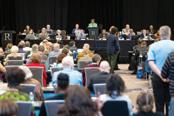
August 20-24, 2025


the Gila River Indian Reservation, the resort offers exquisite dining, relaxation, and unique cultural experiences .
Learn more at www.parliamentarians.org/ convention-2025-hotel.
Room Rate: $149 plus tax, resort fee ($10/night plus tax), and a $15 one-time porterage & room attendant fee
Resort fee includes access to outdoor pools, tennis courts and equipment rental, Aji Spa fitness center, free shuttle service to Phoenix Premium Outlets, where you’ll find shopping and restaurants, Whirlwind Golf Club, Wild Horse Pass Hotel & Casino, and seasonal cultural activities .
Book your stay at https://book.passkey.com/event/ 50876113/owner/24587/home or call (602) 225-0100 before July 25 to receive the reduced rate The Convention rate is available on stays August 16-26, 2025 . Be sure to reserve your room early!


The Sheraton Grand is about 15 miles south of Phoenix Sky Harbor International Airport . The best way to get to the hotel from the airport is by taxi, Uber, or Lyft .

Driving to Phoenix? The resort offers free self-parking .
Sheraton grand at Wild horse Pass 5594 W . Wild Horse Pass Blvd . Phoenix, AZ 85226
Choose from these convenient and secure options to sign up early for the 45th Biennial Convention . Prices increase August 13 .
• Register online at www.parliamentarians.org/ convention-2025.
• Register by mail using the accompanying registration form .
• Register by calling NAP HQ at 816 833 3892
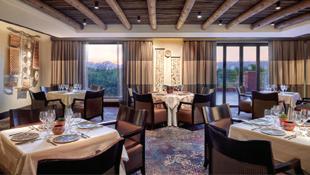



Full In-Person Convention registration fees include admission to all business meetings and educational sessions, as well as the Welcome Reception on Wednesday, breakfast buffet and lunch on Thursday, Friday, and Saturday, and the Closing Banquet on Saturday . Additionally, registrants will have online access to supporting materials for educational sessions and free access to recorded sessions for up to 90 days after posting .
Post-Convention Workshop Recording registration gives access to the recorded workshop sessions for up to 90 days after posting (This option does not include live access to workshops .)
(June 1-August 12)
August 12)

Registration refund requests must be received in writing by NAP Headquarters no later than July 24, 2025 . A $75 cancellation fee will apply . No refunds will be issued for no-shows or cancellations received after July 24, 2025 A $30 handling fee will be assessed for all returned checks
By Josh Martin, PRP
Can you spot the parliamentary blunders in the following stories?
BLuNDER #1
At the September meeting, a motion was made to co-host a regional symposium with a partner organization . During debate, a member raised a request for information, asking whether co-hosting would obligate the organization financially . The chair refused to answer, stating that requests for information were only allowed after debate had concluded . Where was the blunder?
BLuNDER #2
During the second day of a multiday convention, a member who had not attended the previous meeting moved to reconsider a motion that had been adopted at that prior meeting . The chair, noting the motion was within the required time frame, allowed the motion to proceed . Where was the blunder?
BLuNDER #3
At the May meeting, following a contentious vote, a member requested a counted vote instead of the voice vote just taken . The chair responded that the result had already been announced and declared final, and that no further verification was allowed once the chair had declared the result . The chair then introduced the next item of business . Where was the blunder?
Answers are on page 38.

Josh Martin, PRP, is currently NP Assistant Editor . He joined NAP in 2009 and received the RP and PRP credentials in 2010 and 2011, respectively Josh is also the current Treasurer, Past President, and Vice President of the Minnesota State Association of Parliamentarians He is a former member of the NAP Bylaws Committee and served as Technical Editor for the third and fourth editions of Robert’s Rules of Order for Dummies by Alan Jennings, PRP
The intent of this column is to provide general answers or advice (not formal, official opinions) about the questions asked . The answers are based on the most recent edition of Robert’s Rules of Order Newly Revised, unless otherwise indicated, and do not take into account such governing authorities as statutes, bylaws, adopted special rules of order, other parliamentary authorities, or earlier editions, except as specifically mentioned . The abbreviations used in these questions and answers are explained in National Parliamentarian, Vol . 85, No . 1, Fall 2023, p . 30 .
Questions should be e-mailed to npquestions@nap2.org.
A committee chair can speak first on a committee motion.
QQuESTION:
Our organization does most of its business through committees. The standard procedure is for the committee chair to give the committee report, then read each recommendation for action, including the rationale. Almost all of these committee recommendations originate from the committee, and are not recommendations of referred motions. After the presiding officer states the motion, and calls for debate, the committee chair then is recognized first in debate. Some members have raised concerns that this seems like undue domination of the debate by the committee chair. Once the committee chair has read the rationale, some feel that it is overkill to add more in debate. Is our procedure correct? RONR (12th ed.) is our parliamentary authority.
As your organization’s parliamentary authority is RONR (12th ed .), the answer is directly stated in RONR (12th ed .) 42:9:
If the member who made the motion that is immediately pending claims the floor and has not already spoken on the question, he is entitled to be recognized in preference to other members . Under some particular cases or variations of this rule, the members entitled to preference in recognition are: a) in the case of a motion to implement a recommendation in a committee’s report, the reporting member (who presented the committee’s report to the assembly)… .
In other words, the committee chair, as the default reporting member for a committee, RONR (12th ed .) 51:8, presents both the committee report and recommendations . This includes committee recommendations for action on new matters not previously referred, which are substantive motions . RONR (12th ed .) 51:11 .
Under the rule as stated in RONR, even if another member serves as the committee’s reporting member, that person will also be the first member of the
assembly to be recognized in debate . It is true that in certain circumstances the sheer amount of verbiage from a single presenter can be overwhelming . Some people might tune out, and others may feel the committee has an unfair advantage in presentation time, as noted in the question .
One way to address this concern is for the committee chair to arrange remarks in debate so that they are not repetitive of statements made as part of the committee report . Often, the verbal committee report presented is simply a summary of a more detailed written committee report submitted in advance, rather than a verbatim reading of the report as permitted in RONR (12th ed .) 51:9 (b) . See American Institute of Parliamentarians Standard Code of Parliamentary Procedure (2nd ed .) (AIPSC) 31 .57 . With some planning, the committee chair’s report presentation and debate need not be repetitive .
Even though members cannot yield time in debate to other members, RONR (12th ed .) 43:10, it would also be possible for the reporting member to suggest in the committee report presentation an incidental motion in the nature of a request for another privilege, RONR (12th ed .) 33:22, for the first speaker in debate to be another representative of the committee . Usually this suggestion would be accepted by general consent . See RONR (12th ed .) 59:82-83 (suggesting alternative procedures for committee recommendations) . If it is not, a motion to suspend the rules (RONR (12th ed .) 25:1) regarding priority in debate could be raised . RONR (12th ed .) 42:9 .
The procedures for recognition in debate under RONR (12th ed .) are similar under other parliamentary authorities – a committee’s reporting member as the maker of the motion is recognized as first to speak in debate . AIPSC (2nd ed .) 11 .14 (1); Demeter p . 44; Keesey p . 109; Riddick pp . 72, 170 .
Do committee members have a conflict on interest in regard to committee motions?
QQuESTION:
Members question how committee members can participate in debate and vote on committee recommendations in meetings of the assembly. Isn’t it a conflict of interest for committee members to participate after they present their report? They are so much more familiar with the issue than other members of the assembly. It seems unfair and gives committee members’ comments undue influence over the debate.
ANSwER:
Those members who are concerned about committee members being knowledgeable about committee recommendations are confusing conflict of interest with familiarity, or perception of bias . These are two different issues and therefore they are treated differently in meetings . Both familiarity and conflicts of interest may result in bias, or a perception of bias . But they arise in different ways and must be treated differently .
A conflict of interest arises when a member has a personal interest in a matter, typically a financial interest, but perhaps a competing fiduciary obligation to someone else or a different entity, or some other personal benefit to the member or an immediate family matter . There are two different interests in conflict – the member’s personal interest, or alternative obligation, and the interests of the organization . RONR (12th ed .) 45:4-5; AIPSC (2nd ed .) 5 .59-62; 22 .15, 30 .16-18; Keesey pp . 159-60 (defines “personal interest” as an issue involving reputation or integrity); Riddick p . 2 .
Perception of neutrality, as required of the presiding officer and the parliamentarian, is a different issue and is articulated differently in the parliamentary authorities . RONR (2nd ed .) 43:29-30, 47:10, 47:55; AIPSC (2nd ed .) 5 .37, 27 .17, 27 .43-44; Demeter pp . 41-43, 253-54; Keesey pp . 122-23, 133; Riddick pp . 40, 136-37, 146 . A presiding officer or a member parliamentarian is not expected to have no personal opinion on issues coming before the body . In fact, as leaders within the organization, it might possibly show undue disengagement if these officers did not have opinions about important issues coming before the body . But they are expected to refrain from conduct or statements that show partisanship so that the members understand that they are not taking advantage of their positions to influence the debate .
A committee member is expected to educate him- or herself about the issues that the committee is working on so that he or she can participate actively in committee work and make a significant contribution . RONR (12th ed .) 50:18 . That does not mean that committee members develop a conflict of interest in the matter being studied . They do not gain any financial benefit or develop a contrary fiduciary responsibility, as a committee is entirely subservient to the body that it reports to . RONR (12th ed) 50:1 . Nor does a committee member’s reputation or integrity become affected simply by studying an issue well enough to make a reputation for action by the committee’s appointing body . In fact, AIPSC (2nd ed .) 25 .9 specifically indicates that reference committee members should be with likely conflicts of interest should disqualified from committee participation, indicating that the type of experience that a reference committee member obtains is not a form of conflict of interest . In short, committee members are not expected to be perceived as neutral like the meeting chair . All members of a body bring their background and experience to a deliberative meeting and shares his or her perceptions and understanding with other members through the deliberative process . Ordinary members are not expected to be blank slates making decisions solely on the basis of the information provided in debate, like jurors limited to considered properly introduced evidence at a trial . In a deliberative assembly, in its most contentious proceeding, member discipline, only the accused member leaves the room and is prohibited from participating in deliberations over guilt and penalty . “If the trial is before the assembly rather than a trial committee, the managers, defense counsel (if members of the society), and member witnesses for both sides remain, take part in discussion, and vote as any other members . ” RONR (12th ed .) 66:33 (e) . Committee members are
(or should be) somewhat more familiar with the issues raised by a committee report . That is to be expected and adds to the ability of the group as a whole to come to an informed decision . Committee members should not be disqualified for a conflict of interest just because they might be more knowledgeable than most other members of the assembly .
how to handle questions on a committee report
QQuESTION:
Our organization does most of its business through committees. After the committee report is completed, the committee usually responds to questions about the report. The chair usually controls this question and answer time, but the number of questions an time spent on questions keeps expanding. what is the best way to handle this practice? RONR (12th ed.) is our parliamentary authority.
ANSwER:
As your organization’s parliamentary authority is RONR (12th ed .), question and answer time after committee reports is not generally permitted . A committee that presents a report without recommendations simply rests after its report is presented and then the next committee starts its report, or the meeting moves on to the next order of business if there are no further committee reports . RONR (12th) 41:14, 41:17, 51:09 . Only if there are committee recommendations for motions, is there debate . RONR (12th ed .) 51:10-12 . But that is standard and formal debate on the relevant motion, not question and answer time . The only way to ask a question to the committee is to raise a request for information, which is subject to the standard constraints, that the information requested from the committee be “relevant to the business at hand . ” RONR (12th ed .) 33:6 . This is in keeping with the fundamental principle of parliamentary procedure that there can be no discussion without a motion on the floor . RONR (12th ed .) 4:7-8 .
It should be noted that it is becoming a more common practice for committees to take questions on their reports even if there are no recommendations for action . See AIPSC (2nd ed .) 31 .60 (committee report open for comment or questions); Keesey p . 148 . If committee reports are submitted well in advance so that the members can study them in advance . AIPSC (2nd ed .) 31 .57-58 . Often, conferences and conventions set aside time for town hall-style nondeliberative meetings before the business meeting for committee leadership to meet with voting members to answer questions about the committee’s recommendations . This type of meeting for questions on essentially complete committee recommendations is different from hearings before a reference committee making recommendations of proposals before them . RONR (12th ed .) 50:27, 59:79; AIPSC (2nd ed .) 25 .21-37; Demeter pp . 289-91; Riddick p . 99 .
Another way for an organization with RONR (12th ed .) to allow for committee question time during a meeting would be to adopt a special rule of order to allow for a standardized question and answer time as a regular matter . If such special
rules are adopted, it is recommended that the standard question and answer time be limited to a specific time period, which could be varied in specified circumstances . Otherwise, question time can grow to absorb significant meeting time . Some organizations adopt an agenda that includes a specific time allotment for questions after some or all committee reports . This is not recommended without also adopting a standard procedure for how to handle questions, such as whether questions can address anything within a committee’s purview, or only subjects of the committee report . Some organizations allow question time on committee recommendations before starting debate . This is not recommended, with the exception of questions that qualify as requests for information, RONR (12th ed .) 33:6, and are necessary for a member to understand the motion . Keesey pp . 148-49 contains recommendations on limitations on questions to committees for organizations that do wish to include this procedure in their meetings .

Michael Malamut, PRP, Chair
Shannon
PRP
Sun,

Michael
C Taliercio,
PRP

Rachel Glanstein, PRP, Committee Advisor
from page 33
ANSwER #1
C
J
Cavin, PRP, NAP Parliamentarian, Consultant

The chair was mistaken . A Request for Information which is germane to the business at hand is in order during debate . See RONR (12th ed .) 33:2, 33:6 .
ANSwER #2
Only a member who voted on the prevailing side may move to reconsider a motion . A member who was not present at the time of the vote is not eligible to move to reconsider (except in committees) . See RONR (12th ed .) 37:10 .
ANSwER #3
The chair was mistaken . A member may promptly request a division following a voice vote, or may move that the vote be counted, which requires a majority vote for adoption . See RONR (12th ed .) 29:5 .
NAP congratulates the following individuals on becoming Registered Parliamentarians:
Creston Whiting-Casey (CA)
NAP commemorates members who have passed from our midst; may they rest in peace: Edna Arrington (MI)
On March 31, 2025, by a two-thirds vote, the NAP Board of Directors suspended Lorenzo Cuesta’s membership in NAP and his credentials through July 31, 2025, and upon reinstatement, he be required to complete eight hours of professional responsibility courses supervised by the Professional Responsibility and Member Discipline Committee by December 1, 2025 This decision came as a result of a recommendation by the Professional Responsibility and Member Discipline Committee
NAP welcomes the following individuals as new members:
Musheerah Ali (NC)
Mattie Anderson (TN)
Jennifer Ayre (NC)
Kandice Besaw (WA)
Angela Blue (MI)
Kyle Bogan (OH)
Carmilla Bourn Wilson (MI)
Scott Bowman (KY)
Pierre Y. Boynton (MD)
Tamica Bradshaw (CA)
Amy Brown (SC)
Clifford Brown (CA)
Danielle Brown (PA)
Darius Canuela (CA)
Christian Catano (MN)
Rae Chornenky (AZ)
Theresa Clincy (CA)
Stephen Congly (AB)
Parker Crawley (OK)
Danyell Crutchfield Cummings (AR)
Jacqueline Daniels (NC)
Manu Datta (NJ)
Monet Davis (PA)
Reeshemah Davis (TX)
Darlene DeFour (NY)
Bruce Delphia (VA)
Jennifer Denson-Garcia (FL)
Brenda DeRamus-Colemam (AL)
Maya Dickerson (MD)
Terrell Dinkins (EL)
Christina Dogan-Bonam (CA)
Jonie Duplessis (LA)
Sharon Luster Dykes (MN)
Kamella English (EL)
Keisha Fields (TX)
Ashlee Foster (WY)
Robert Gaines III (FL)
Keturah Garnerway (TX)
Tiffini Gilliam (GA)
Sharlotte Jenell Green (EL)
Dr Hazel Green-Dunston (VA)
Felecia Greer (MD)
Lori Haam (MI)
Michael Hammett (SC)
Carmina Hill (TX)
LaStarr Hollie (TX)
Bridget Holloman (NJ)
Pamela Holman (NJ)
Anna Horn (TX)
Lynda House-McPeters (TX)
Talib Hudson (NY)
Emma Israel (IA)
Chrishangla Johnson (TX)
Debra Lynn Johnson (TX)
Keri Johnson (TX)
Lisa Jones (TN)
Tygressa Jones (MD)
Dorian Jordan (TX)
Michael Jordan (IN)
Charles Kaminski Jr (GA)
Continued on page 40
* For the period March 6, 2025 through May 23, 2025
Vivian Fayne Kinnard-Smith (TX)
Michael Kozlik (AL)
Annabelle Kumm (NE)
Kristen Kvalheim (WI)
Monica Diane Lamar (PA)
Sara Lassiter (LA)
Angela Lawary (AZ)
Dina Lewis (CA)
Kathy Linnemeyer (WA)
Lance Little (MI)
Robert Loop (GA)
Katherine Malfa (MD)
Vivian Maner (TX)
Lauwana Martin (GA)
Kari Martinez-Bailey (WA)
Felita Martino (SC)
Anil Mathai (CO)
William Matthews (TX)
Lisa McClease (GA)
Krystal McCully (MI)
Yvette McDermott Thomas (VA)
Maribel Meekins (TX)
Regenia D . Melvin (DC)
Megan Meyer (WI)
Stafford Miller (NJ)
Quiana Mitchell (TX)
Sarah Mobroten (WI)
Benjamin Mount (NC)
Mia Murria (GA)
Ben Nicholas (CO)
Portia Osborne (AL)
Lisa Owens (NEAP)
Paul Padilla (CA)
Anthony Makana Paris (HI)
Charmaine Parrish (PA)
Christy Peters (TN)
Tawnia Pett (CA)
Brett Pickerign (NEAP)
Aurora Pipeling (NJ)
Jarrett Plumley (VA)
Robert Pope (NC)
Devin Prophet (TX)
Kathleen Reddick (NJ)
Cheryl Richardson (DE)
Mark Russell (TX)
Shelly Sanders (NJ)
Steve Schafer (AZ)
Sadie Schaneman (WA)
Glenn Schulz (MO)
Michael Sedgwick (MD)
Tiffany Shippy (GA)
Anzhelika Simonenkova (CA)
Gina Sinclair (TX)
Morgan Slaven (VA)
Eugene Smith (TX)
Evella Mickey Smith (NC)
Jennifer Smith (EL)
Tiffany Spencer (KY)
Tonia Stephens (AL)
Donna Stoeling (NC)
Patricia Swanson (NY)
Fredi Taylor (IL)
Jacqueline Turner (GA)
Daniel Warren (NC)
Barbara Washington (TX)
Heidi Watzak (FL)
Arther Wells Chapman (TN)
Simon Wheaton-Smith (NM)
Creston Whiting-Casey (CA)
Charlotte Williams (NC)
Juanita Williams (TX)
Gina Williams-Jackson (TN)
Pamela Willingham (TX)
Lisa Workman (ON)
Christina Worsley (SC)
Whitney Wright (SC)
Terry Young (CO)
Benjamin Zastrow (MN)
Norayr Zurabyan (CA)
A special thank you to the instructors of the aforementioned new members:
Ceresh Perry
Diane Blount
Tyna Davis
Elise Mason
Fashika Willis McClelland
Kay Crews
Kevin Felici
Marsha Turner
Maya Smith
Ramsey Cooper
Donna Mitchell
Tracey Howard
Tamara D Harris
Sandra Cook
Steven Cook
Rufus Sadler
We Want You!
* For the period March 6, 2025 through May 23, 2025


Tu E sd Ay, Augus T 19, 2025 11:00 Am-4:45 P m s h E r AT o N g r AN d AT Wild h ors E PA ss
Presented by National Association of Parliamentarians Educational Foundation

An essential overview of parliamentary procedures in tribal governance.
This FREE one-day workshop, which includes lunch, is designed specifically for tribal leaders and staff, tribal members, and others engaged in tribal governance.
Featured Presentations:
• When One Size Doesn’t Fit All: Challenges Faced in Tribal Governance
• Main Motions: The First Step of Conducting Business in Meetings
• Making Motions Work: Effectively Using Subsidiary & Supporting Motions
• Professional Registered Parliamentarians Answer Your Questions
All speakers are professional parliamentarians who work with tribal nations.
RegisteR today!


Seating is limited.
The National Association of Parliamentarians Educational Foundation (NAPEF) is a non-profit organization that provides funding for parliamentary education offerings, grants, and scholarships.
To learn more about NAPEF, visit www.napef.org.
Registration deadline is Friday, August 1, 2025.